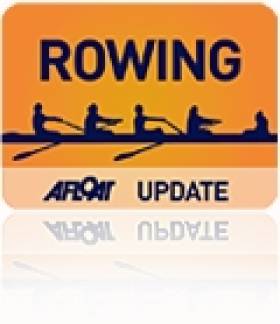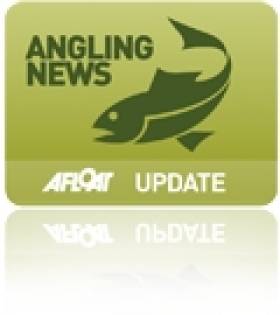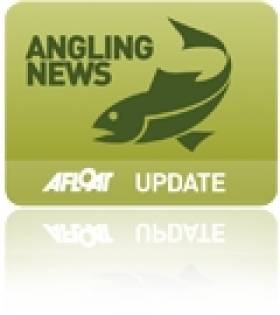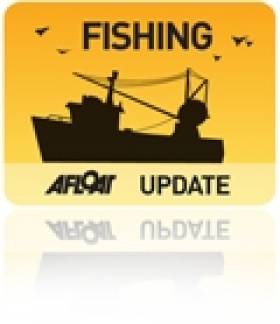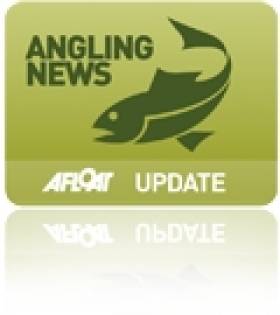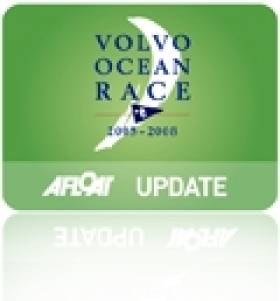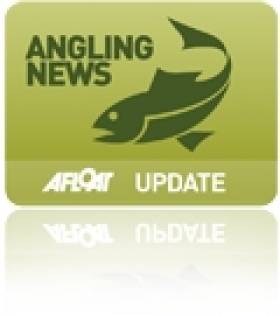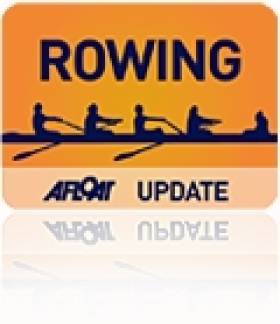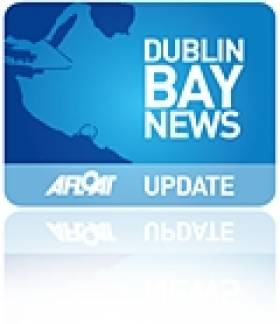Displaying items by tag: commercial
# ROWING: Commercial topped the rankings with 11 wins and seven second places at the Neptune Head of the River at Islandbridge today. A Commercial/Neptune senior eight won the final race of the day, beating English visitors Broxbourne by half a length in three minutes 46 seconds, the fastest time of the regatta. Colm Dowling, the number seven man in the crew, had earlier won the senior single sculls title. The regatta was held in cold, sunny conditions and had a particularly big entry from Northern Ireland clubs Bann and Portora.
Neptune Regatta, Islandbridge (Selected Results)
Men, Eight – Senior: 1 Commercial/Neptune (W Yeomans, I Kelly, L Hawkes, AJ Rawlinson, F Groome, J Graham, C Dowling, M Maher; cox: G Connolly) bt Broxbourne ½ l 3:46. Intermediate: Broxbourne bt Portora 1l, 3:54. Novice: Belfast RC bt Bann 1l, 4:12. Junior 16: Portora A bt Bann 2 ¼l, 4:07. Junior 18: Neptune bt Commercial 3l, 3:59. Masters: Old Collegians/Three Castles bt Waterford BC 3l, 5:21.
Fours – Intermediate One, coxed: Portora bt Bann 1l, 4:24. Novice, coxed: Belfast bt Trinity 1¾ l, 4:52. Junior 18, coxed: Portora bt Neptune 1½ l, 4:25. Masters, coxed: Old Collegians bt Carlow 2l.
Sculling, Quadruple – Novice, coxed: UCD bt Trinity 2 ½ l, 4:32. Junior 18: Neptune bt Commercial easily 4:16. Junior 16, coxed: Commercial bt Portora 2 ½ l, 4:29. Junior 15, coxed: Portora bt Bann 1ft, 4:41.
Double – Junior 16: Waterford bt Offaly easily. Junior 15: Commercial bt Athlone A easily, 5:04.
Single – Senior: Commercial (Dowling) bt Three Castles (Corcoran) easily, 4:59. Intermediate: Garda (Kelly) bt Three Castles (Corcoran) 2 ¾ l, 4:49. Novice: UCD (Toland) bt Sligo (Patterson). Junior 18: Commercial (W Yeomans) bt Athlone (Munnelly) disq. Junior 16: Athlone (Munnelly) bt Waterford (Goff) 2 ¾ l, 4:58.
Women
Eights – Intermediate: UCD bt Commercial 2ft, 4:22. Novice: Bann bt Belfast RC easily, 4:34. Junior 16: Portora A bt Portora B easily, 4:50.
Fours – Novice, coxed: Trinity A bt Belfast B 2¾ l, 5:04.
Sculling, Quadruple – Novice, coxed: Commercial bt Neptune ¾ l, 5:21. Junior 18: Commercial bt Neptune easily, 4:54. Junior 16, coxed: Carlow bt Portora 5:04. Junior 15, coxed: Bann A bt Athlone 3½l, 5:11.
Double – Junior 16: Neptune B bt Neptune A. Junior 15: Bann bt Athlone 1l, 5:38
Single – Senior: Commercial (S Dolan) bt Commercial (E Lambe) easily, 5:32. Intermediate: Trinity (O’Brien) bt Commercial (Foley) easily, 5:27. Novice: Bann (Barry) bt Commercial (Foley) 3l, 5:25. Junior 18: Neptune (Kavanagh) bt Carlow (Byrne) ½ l, 5:36. Junior 16: Commercial (Lambe) bt New Ross (Nolan) 2ft.
Historic Rowing Dead Heat at Dublin Head of the River
# ROWING: The Dublin Head of the River finished in a dead heat on Saturday, the first time this has happened in exactly 60 years. A big composite crew built around the Commercial senior four and with with members of three other clubs finished with the same time as UCD in cold and clear conditions. The college crew rested their senior oarsmen for the event.
The only other dead heat in the 69 years of the event came in 1953 when UCD and Trinity dead-heated in an event which featured only nine crews. An impressive number of crews – 32 – took on the sometimes choppy water this year, but the boats set off at sometimes very long intervals, dulling some of the competitive edge.
UCD’s senior women won their battle with Trinity, covering the course from the Ha’penny Bridge to Islandbridge nine seconds faster than their rivals.
One negative note was the break-in and theft from three cars in the UCD car park.
Dublin Head of the River (Selected Results)
Overall: 1= UCD senior eight; Commercial/Grainne Mhaol/ Old Bones/University of Limerick 10 minutes 32.0 seconds; 3 UCD intermediate eight 11:02.0, 4 Trinity novice eight 11:17.0, 5 UCD intermediate eight 11:25.0, 6 Neptune junior eight 11:35.0.
Graded Results
Men, Eight – Senior: 1= UCD and Commercial/Grainne Mhaol, Old Bones/University of Limerick 10:32.0. Intermediate: 1 UCD 11:02.0, 2 UCD B 11:25.0, 3 Commercial 11:41.0. Novice: 1 Trinity 11:17.0, 2 Queen’s 11:39.0, 3 Trinity 12:09.0. Junior: 1 Neptune 11:35.0, 2 Blackrock College 12:27.0, 3 Neptune B 14:49.0.
Four – Senior: 1 Commercial B 12:35.0, 2 Commercial 31:18.0. Masters: Commercial 13:28.0. Quadruple – Novice: Trinity 13:49.0.
Women – Eight, Senior: 1 UCD 12:04.0, 2 Trinity 12:13.0. Intermediate: 1 Commercial 12:56.0, 2 UCD 12:58.0. Novice: 1 UCD 13:34.0, 2 Trinity 13:57.0, 3 Trinity B 14:08.0. Junior: 1 Commercial 14:00.0, 2 Commercial B 15:33.0.
Four – Senior: Trinity 14:47.0.
NI Anglers Take to Facebook to Save Their Salmon
#ANGLING - Northern Ireland river anglers are taking a novel approach to lobbying Stormont over salmon exploitation by harnessing the power of social networking.
According to the News Letter, the NoSalmonNets campaigners "have swapped their fishing rods for laptop computers", using Facebook to attract support for their campaign to bring an end to the offshore netting of wild salmon stocks.
As previously reported on Afloat.ie, Northern Ireland's Department of Culture, Arts and Leisure (DCAL) has called for a voluntary ban on offshore salmon fishing, following new research that shows a significant drop in their numbers in the North's rivers.
Seamus Donnelly of NoSalmonNets has welcomed DCAL's recent decision to stop issusing licences for commercial salmon nets that may "contravene European law" off Antrim's north coast, made in an effort to protect salmon stocks in the Foyle river system.
Donnelly explained that the campaign was borne from frustration at the apparent inaction by the NI Executive over the protection of salmon.
“One of the keys to our success has to be Facebook," he said. "The internet has an unlimited reach and we took advantage of that.”
The News Letter has more on the story HERE.
NI Calls for Voluntary Ban on Offshore Salmon Fishing
#ANGLING - Northern Ireland's Department of Culture, Arts and Leisure (DCAL) has called on anglers to help protect the North's wild salmon, following new research that shows a significant drop in their numbers.
Fisheries Minister Carál Ní Chuilín told BBC News: "The continued commercial exploitation of wild Atlantic salmon and killing of salmon caught by rod and line in the DCAL jurisdiction is currently untenable."
Annual monitoring of Northern Ireland's salmon rivers has shown a failure to reach targets most years since 2002. The survival rate of salmon in the marine phases has in some cases dropped to as little as 5%.
DCAL has now urged offshore salmon anglers and fishermen to forego applying for 2012 licences, to give time to consider options for the future of salmon fishing.
BBC News has more on the story HERE.
Strong Debate Over Proposals for Fishing-Free Zones in Strangford Lough
#FISHING - Proposals to close substantial areas of Strangford Lough to fishing vessels have been met with strong criticism by Northern Ireland's commercial fishermen.
In a recent letter to the News Letter, Paul Leenan writes asking Fisheries Minister Michelle O'Neill to clarify the government's position following a complaint to the European Commission by the Ulster Wildlife Trust regarding the protection of horse mussel reefs in the lough.
While recognising the importance of the lough's marine ecosystem, Leenan writes: "The notion that substantial areas of the lough could be closed to fishing vessels is of serious concern to fishermen, at a time of great economic difficulty.
"Any hasty action could put livelihoods at risk and threaten the viability of the whole fishing industry here."
In response, the Ulster Wildlife Trust claims that "the management of certain aspects of the fauna and flora within the lough has caused... much concern over the past two decades."
Joe Furphy of the trust writes: "If we are to secure a truly sustainable future for the lough, its environment and diverse wildlife, upon which sustainable fisheries rely, then we need to ensure that adequate ‘non-disturbance zones’ are put in place."
IFI Launches 2012 Sponsorship Programme
#ANGLING - Inland Fisheries Ireland (IFI) has announced the launch of its 2012 Sponsorship Programme.
The IFI Sponsorship Programme aims to increase awareness of IFI and its work, recreational angling, the sustainable commercial use of the inland fisheries resource and habitat issues.
Applications are invited from organisers and event promoters that will support the aims of the IFI sponsorship programme.
Events would be supported on the basis of: the location and nature of the event; the potential of the event to introduce new users to angling in an active capacity (ie not just as spectators); and to educate and inform stakeholders of angling, environmental, commercial salmon fisheries and habitat issues.
"The sustainable use of our wonderful inland fisheries and sea angling resources must be promoted," said Minister for Communications, Energy and Natural Resources, Pat Rabbitte, who launched the programme.
"People of all ages can enjoy angling in urban and rural settings, off charter boats and beaches and on quiet riversides.
"In addition, traditional commercial fisheries add value to small local communities, while biodiversity awareness ensures a sustainable resource for all."
Applications and details of the sponsorship programme are available online or from your local IFI office. The closing date for submissions is 27 January 2012.
Green Dragon Backer Works His Magic for VOR in Abu Dhabi
Abu Dhabi's The National has an interview with David Hassett, commercial director of Abu Dhabi Ocean Racing and Irish yachting veteran, ahead of the city's hosting of the Volvo Ocean Race.
Hassett was instrumental in bringing the race to Galway in 2009, and was one of the team behind the Green Dragon, Ireland's underdog entry which took the yachting world by surprise by clinching three podium finishes.
This time round, Hassett is hoping to work similar magic for Abu Dhabi as it hosts a stopover of the next Volvo Ocean Race at the end of the year - and enters its own yacht in the competition, with at least one Emirati crewman on board.
As commercial director, 40-year-old Hassett - originally from Cork and a championship sailor in his youth - is responsible not only for raising funds, but making sure that his sponsors get the best return on their investment. And that means getting their race entry seen.
"It's my job to ensure that the billboard is effective," he says. "Everywhere the boat goes, the name Abu Dhabi goes and it becomes synonymous."
Top pritority for Hassett is marketing Abu Dhabi as a "winter watersports destination", and encourage more people in the region to get off their jet skis and into sailing.
The National has more on the story HERE.
Proposals to Lift Bass Fishing Ban Cause a Stir
The Government's proposals to lift the ban on commercial bass fishing has raised the ire of at least one letterwriter to The Irish Times.
Guy Pitcher writes in today's newspaper that "the commercial ban has saved this very slow-growing species from otherwise over-exploitation and ruin for decades to come".
He adds: "There is absolutely no hope and no precedent for believing that a commercial bass fishery could be 'sustainable' as it is, regrettably, human nature to grab as much as one can before someone else does."
The Englishman, who fishes regularly in west Cork, argues that any benefit to the economy from commercial fisherman "making a fast buck" is "dwarfed by the long-term sustained benefit from continued angling tourism".
Do you agree that lifting the ban will see a return to overfishing? Or do you think that any measure to assist Ireland's economic growth should be considered? Have your say in the comments below.
Queen's and Portora Impress at Erne Head
Two men’s senior eights from Queen's University slotted into the first two slots at the Erne Rowing Head of the River at Enniskillen. The junior 18 quadruple of the host club, Portora, had a fine result, finishing joint eighth overall.
Erne Head of the River, Enniskillen
Overall: 1 Queen’s A men’s senior eight 19 minutes 53 seconds, 2 Queen’s B men’s senior eight 20:21, 3 University of Limerick/St Michael’s men’s senior eight 20:40, 4 Trinity men’s intermediate eight 20:59, 5 Bann men’s junior 18 eight 21:09, 6 Methodist College, Belfast men’s junior 18 eight 21:47.
Men, Eight – Senior: 1 Queen’s A 19:53, 2 Queen’s B 20:21, 3 University of Limerick/St Michael’s 20:40. Intermediate: Trinity 20:59. Novice: 1 Trinity 21:47, 2 Queen’s 22:38, 3 Queen’s B 24:51. Junior 18: 1 Bann 21:09, 2 Methody 21:47, 3 St Joseph’s 22:02. Junior 16: St Joseph’s 23:50. Masters: Belfast BC (E) 24:06.
Four/Quadruple Sculls – Senior: 1 Belfast RC (quadruple) 23:01, 2 LSC (quad) 24:45. Intermediate: 1 Trinity (quad) 22:17, 2 Queen’s (coxed four) 23:39, 3 University of Limerick (quad) 23:59. Junior 18: 1 Portora (quadruple) 22:02, 2 Commercial (quad) 22:51, 3 Portora (coxed four) 22:56. Junior 16: Bann (quad, coxed) 24:05.
Women, Eight – Senior: 1 Trinity 23:42, 2 NUIG 23:51. Intermediate: 1 Queen’s 23:45, 2 Trinity 26:02, 3 Methody 26:16. Novice: 1 Queen’s 25:07, 2 Trinity A 26:29, 3 Trinity B 26:40. Junior 18: 1 St Michael’s 24:41, 2 Portora A 27:24. Masters: Belfast BC (D) 25:39
Four/Quadruple – Senior: 1 Portora (quadruple) 24:32, 2 Trinity (coxed four) 27:28, 3 Garda 28:11.
Click this link for Irish Rowing detailsClick this link for the Latest Rowing News
Dun Laoghaire Harbour Invites Public's Views on Masterplan
The Dun Laoghaire Harbour Company has invited the public to submit their ideas about the future of the harbour. A masterplan is to be developed so to address the changing emphasis of the harbour from a commercial harbour to a recreational harbour and the impact of change in the profile of ferry sailings on the Dún Laoghaire - Holyhead route. For further details please logon HERE In addition a map of the harbour, showing the extent of the area concerned.


























